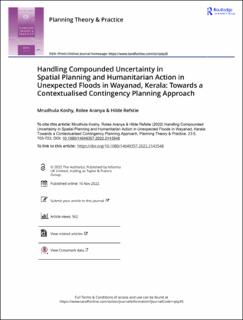Handling Compounded Uncertainty in Spatial Planning and Humanitarian Action in Unexpected Floods in Wayanad, Kerala: Towards a Contextualised Contingency Planning Approach
Peer reviewed, Journal article
Published version
Permanent lenke
https://hdl.handle.net/11250/3064130Utgivelsesdato
2022Metadata
Vis full innførselSamlinger
Sammendrag
Increasing environmental crises due to climate change calls for bridging the research and operational logics of spatial planning and humanitarian response. This article explores how long-term spatial planning and short-term humanitarian responses relate to three facets of uncertainty that are particularly relevant in developmental contexts, namely epistemic uncertainty, ontic uncertainty, and ambiguity. The authors explore these facets through a case study of uncertainty, that of unexpected monsoon floods in 2018 and 2019 in Wayanad, a peri-urban hill district in Kerala, India. Through the case, they show that compounded uncertainty leads to ambiguity in action, but that this ambiguity can be ameliorated by a contextualised contingency planning approach. The authors conclude the article by outlining the approach in spatial planning that prioritises flexible and adaptable decision-making to enhance iterative organisational learning and action, as well as cross-sectoral dialogue to deal with uncertainty.

